ВУЗ: Не указан
Категория: Не указан
Дисциплина: Не указана
Добавлен: 18.10.2024
Просмотров: 252
Скачиваний: 1
Demand
for moneyFigure 1: Demand and Supply in the money market
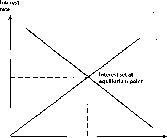
78Macmillan Guide to Economics Unit is
В Comprehension
Now read the text again and decide whether these statements are true or false.
When the government sets interest rates, commercial banks must set
Before you read 13
What does economics study? 17
What are 18
microeconomics and macroeconomics ? 18
Before you listen 20
Before you read 22
History of economic thought 23
Before you listen 26
Before you read 27
Econometrics 28
Before you listen 29
Before you read 33
The law of demand 34
Before you listen 35
Unit 40
Before you read 40
The traditional economy 40
Before you listen 41
Before you read 43
The market economy 43
Before you listen 44
The planned economy 46
Before you listen 51
Before you read 56
Before you listen 59
Revision Vocabulary Units 1 to 4 61
Before you read 63
Consumer choices 65
Before you listen 75
Before you read 77
Costs and supply 77
Before you listen 78
Unit 80
Before you read 80
Market structure and competition 80
Before you listen 81
Before you read 82
Monopolies 82
Unit 87
Before you read 87
The labour market 87
Before you listen 88
Before you read 89
Supply of labour 89
Before you listen 91
44Unit 93
45Before you read 93
70Factors of production 93
85Before you listen 95
Before you read 99
Division of labour 100
Before you listen 101
Revision Vocabulary Units 5 to 8 104
Before you read 104
Surplus 105
Before you listen 106
Before you read 111
Price discrimination 111
Before you listen 112
Welfare economics 114
Before you listen 117
Before you read 118
Government revenue and spending 118
Before you listen 119
Before you read 121
Wealth, income and inequality 122
Before you listen 124
Before you read 125
Poverty 126
Before you listen 130
Macroeconomics 133
Before you listen 134
Before you read 135
ф D Vocabulary 135
Aggregate demand and aggregate supply 135
BP E Comprehension 137
Before you listen 137
0 F Listening *))) 137
ff G Speaking 138
Task 138
Revision Vocabulary Units 9 to 12 140
Unit 141
Before you read 141
Money 141
^ В Comprehension 142
Before you listen 142
В с Listening Ц))) 142
Before you read 142
0 D Vocabulary 143
Banks 148
В E Comprehension 149
Before you listen 149
F Listening Ц))) 149
G Speaking 150
Unit 151
Before you read 151
ff A Vocabulary 151
Fiscal policy 151
P В Comprehension 152
Before you listen 152
С Listening 4))) 152
Before you read 153
0 D Vocabulary 153
Monetary policy 153
Before you listen 156
rehension 156
Before you read 159
A Vocabulary 159
Interest rates and the money market 159
В Comprehension 160
С Listening H))) 165
Before you read 166
fiJ D Vocabulary 166
Economic shocks 166
Before you listen 169
G Speaking 170
Before you read 171
fif A Vocabulary 171
Inflation 171
Before you listen 173
Before you read 175
ff D Vocabulary 175
Unemployment 175
Before you listen 176
F Listening H))) 176
E Comprehension 176
G Speaking 176
9 H Writing 177
Revision Vocabulary Units 13 to 16 178
Unit 179
Before you read 179
Economic growth 180
9 В Comprehension 182
Before you listen 182
ff С Listening Ц))) 183
Before you read 183
ff D Vocabulary 183
The business cycle 184
fi? E Comprehension 185
Before you listen 185
F Listening И))) 186
H Writing 186
Before you read 187
f A Vocabulary 187
The open economy 187
? В Comprehension 188
Before you listen 189
С Listening 4))) 190
Before you read 190
BP D Vocabulary 190
Exchange rates 191
0 E Comprehension 193
Before you listen 193
F Listening H))) 194
G Speaking 195
Task 195
Before you read 196
A Vocabulary 196
Exchange rate mechanisms 196
й В Comprehension 197
Before you listen 197
0 С Listening 4))) 197
Before you read 198
9 D Vocabulary 198
International trade 198
Before you listen 199
В F Listening 4))) 199
G Speaking 200
Task 200
Unit 201
Before you read 201
В A Vocabulary 201
Less developed countries 202
в В Comprehension 203
Before you listen 203
0 С Listening *))) 203
Before you read 203
В D Vocabulary 203
The Russian economy in the 19th century 204
fij E Comprehension 205
Before you listen 205
F Listening 4))) 205
Task 207
H Writing 207
A Vocabulary 207
в? В Comprehension 209
Before you listen 209
0 С Listening 4))) 209
Before you read 209
ff D Vocabulary 209
Russia's foreign trade 210
9 E Comprehension 211
Before you listen 211
Revision Vocabulary Units 17 to 21 213
At the end of each day banks usually have less money than
they need. T □ / F □
Before you listen
Discuss the following with your partner.
Read the summary which explains what open market operations are. Try to complete the gaps with words from the box.
Л
■ borrow ■ decreases ■ lend
I reserve Шselling в shortages (x2)
ч
The government can create
(1) of money for commercial
banks by (2) securities.
Securities are a way to (3)
money to the government at an agreed rate of interest. This is what is known as open market operations.When people buy securities the money supply (4) This causes
) in the commercial banks'
) accounts, so they have to
Macroeconomics: the
science of economicgrowth
and stability
T
С Listening H)))
Now you're going to hear someone talking about open market operations. Listen and check your answers.
Before you read
Discuss these questions with your partner.
-» Economists sometimes talk about economic shocks.
What do you thmk this might mean? What might cause a shock to the economy?
fiJ D Vocabulary
Complete each sentence with a word or phrase from the box.
disrupt go on strike gross national product knock-on effect miner sharply stagflation ■ unrest
The total value of a country'sgoods rindservices consumed in one year is called the
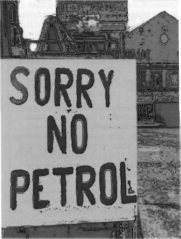
If people are not happy with their government, there may be political
Being a and digging underground
to bring out minerals, must be very dangerous.
Some people as a way of showing
their unhappmess with work conditions or pay.
If we have there is a sharp drop
in production of some goods causing their price to rise.
A fallen tree can the electricity
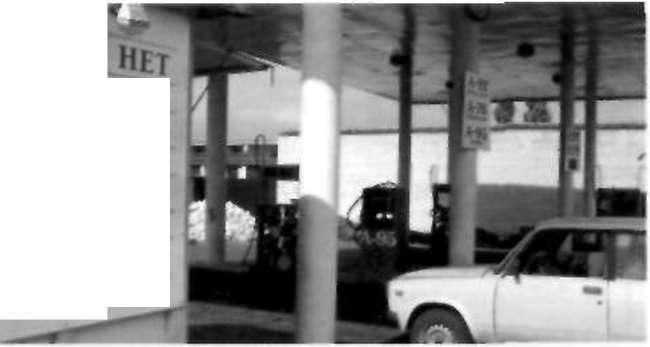
Prices
have risen but unfortunately
wages
haven't.
A-95
A-92 нет
a-76
нет
Д
T НЕТ
Economic shocks
Governments try their K-st to control economic growth, hut there are some things that nolxjdy oan control For example war, political unrest in another country or simply a change in the weather can all affect an economy in unexpected ways. Sometimes the effect of these events will cause a sudden shift in aggregate demand or aggregate supply. This is an economic *1ич'к.
M
a in (I'll I» 1 . n г и tJml 79
Kxternal demand-side slux'ks happen when a country relies heavily on exports or on foreign investment. The (ireat Depression in the 1 Vis is a classic example of this. At the time of the (ireat Depression, many countries exported their goods to the 1'SA. and many other countries relied on American money for investments to help their industries grow. When the American economy collapsed, it had disastrous effects for other economies, too.
Su))})ly-si<k' shocks occur when the supply of goods is disrupted. If the commodity is an important raw material for many industries, then the supply from these industries will drop dramatically. When raw materials are in short supply, they become more expensive. This will cause an increase in manufacturers' variable costs Manufacturers will then have to increase their prices
Imagine, for example, that miners in the iron industry went on strike. The supply of iron and steel to manufacturers would be disrupted. This would mean a drop in supply ol all sorts of goods, from teaspoons to aeroplanes. As you can see from figure 2 below, the sudden drop in supply will cause a shift in the supply curve. As a result, prices rise even though aggregate demand stays the same. This unfortunate situation is called stagflation
figure 7: Aggregate Supply Shock
Now read the text again and choose the best way to finish each sentence.
An economic shock causes ... prices to rise, a demand or supply shift, demand to fall.
Demand-side shocks of a domestic nature ... are caused by events in another country, are only caused because cf a fall in property prices, are caused by events at home.
The Great Depression is an example of... an external demand-side shock, an external supply-side shock, a domestic demand-side shock.
Supply-side shocks can cause ... a fall invariable costs, an increase in variable costs, a fall in fixed costs.
Stagflation is when ...
prices fall but output rises, prices rise and output rises, prices rise and output falls.
A positive supply-side shock is when ... prices fall but output rises, prices rise and output rises, prices rise and output falls.
Before you listen
Discuss the following with your partner.
80
Чип
а
*
Gu'<ie to t г
элеп- ( i en f S
Rise
in pnevs
Before
the sb<K к
Aggregate
Demand
Fait
in ou :put <
Real National Output
The good news, however, is that sometimes positive supply-side shocks happen. These occur when there is a sudden increase in supply while demand stays the same This can happen when new technology makes the production of materials or products much easier or more efficient. The result - prices fall and output grows.
An embargo happens when a country stops trading with another. In 1973, there was an embargo on oil. What effects do you think this had on the world's economies?
Now listen and complete the notes.
After industrial nations enjoyed
economic growth.
They used huge amounts of
A lot of oil came from countries in the
The embargo began on the 1973.
Prices of oil rose to times higher
than before.
The New York Stock Exchange lost
dollars in a few weeks.
В
F Listening H)))
G Speaking
Discuss the following with your partner.
Look at figure i on page 78 and figure 2 on page 80 again.Take turns explaining to your partner what the diagrams show.
Work in groups of three or four. Discuss the effects that these events might have on the economy in your country. Use phrases to describe economic shocks as seen in text 2. Use the space below to make your notes.
coal miners go on strike
large amounts of oil and gas are discovered in Australia
the government provides a free Internet service to anyone who wants it
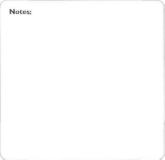
Pronunciation guide
Equilibrium i:kvu rbriam Asset a* set
Homeowner ii.% ,n> n Disastrous <J /ычкъ Stagflation st;r< i lie11n Embargo iniKopi.
Write an essay describing how interestrates are set in the money market. First read through text 1 again and make notes.Then use the plan to help you organise your essay.
Essay
INTRODUCTION
What are interest rates and w'ny art? they important for the economy?
PARAGRAPH 1
What does the money supply consist of? What is demand and supply in the money market?
PARAGRAPH 2
How is the interest rate set by the money market?
PARAGRAPH 3
How does the government try to influence the interest rate?
CONCLUSION
Sum up in a couple of sentences what you have said in paragraphs one to throe.
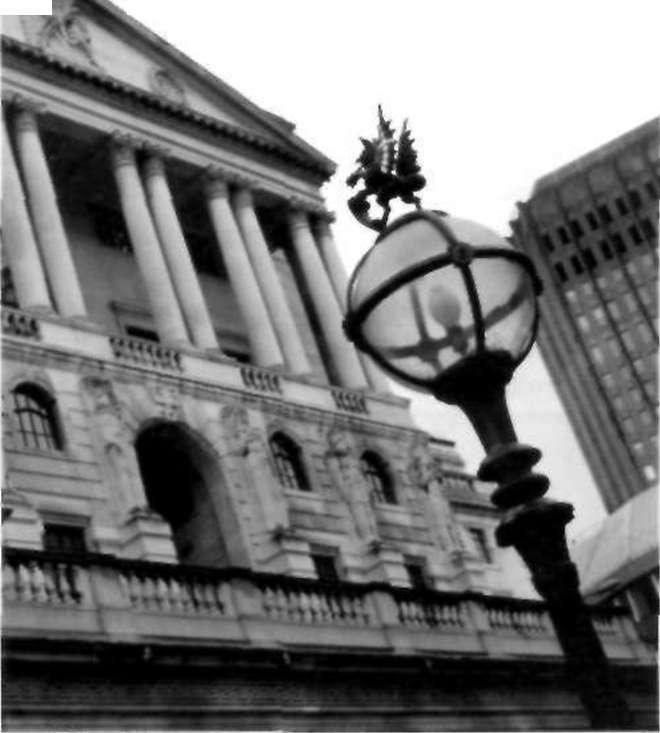
Write 200-250 words
fac
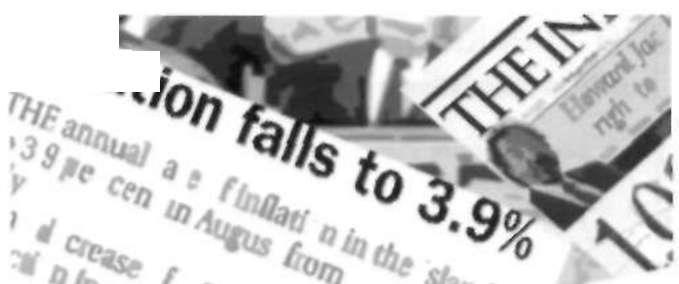
Unit

Before you read
Discuss these questions with your partner.
Jbp
^
fif A Vocabulary
Sf
When something is in the , it
is an important story in the news.
When parents are unemployed it is difficult for a family to make ends
The of living m cities like London and
Tokyo is very high.
People prefer to shop in supermarkets because they find a wide of goods there.
The : i industry includes shops,
supermarkets and department stores.
' In statistics, when a number ie it is multiplied by another number to show its importance.
The is the person or thing that is
responsible for doing somelliing bad.
It is difficult for old people to with
living on a small pension.
• In maths, a/an is a sum which
is equal on both sides.
The speed that something travels at is called
82
м.,„ j > G i. • d m l с Г < о ' о m - • lh«l 16
jadinq 1
Inflation
Inflation is an overall increase in prices over a certain period of time. It's also a worry for anybody who's trying to make ends meet, ami a headache for many governments. The rate of inflation is often in the headlines. However, inflation isn't really news. In most of Кurope, for example, prices have risen year after year for at least the last 5o years. Deflation (overall decreasi in prices) does happen occasionally, but the trend is mostly for the cost of liv ing to increase.
There are lots o| ways to measure inflation. (>ne of the most popular ways is the retail price inr/сл This is calculated by recording increases in price for a range of goods and serv ices. This is .sometimes called a haxket of goods. Some of the goods are weighted more heavily than others liecause the\ are more important For example, food will be weighted more than the cost of a cinema ticket, because a 5'V> increase in food is more important than a 10% increase in the cost of seeing a tilm. Inflation is worked out from an average of all the price increases in the basket.
Inflation can happen for a number of' reasons. Init economists say there are two main culprits. These are denutml-pull inflation and cast-push inflation. Demand-pull inflation can happen when tin- economy is growing last. Aggregate demand begins to grow faster than suppliers can cope with. This causes .1 shortage, ami prices rise. At first, customers may he able to pay the higher prices, and demand grows again. This forces prices up even more, and the cycle continues.
< >ne of the characteristics of demand-pull inflation is that there is often too much money going round the economy This is explained by the quantity theory of money This theory use's the following equation: